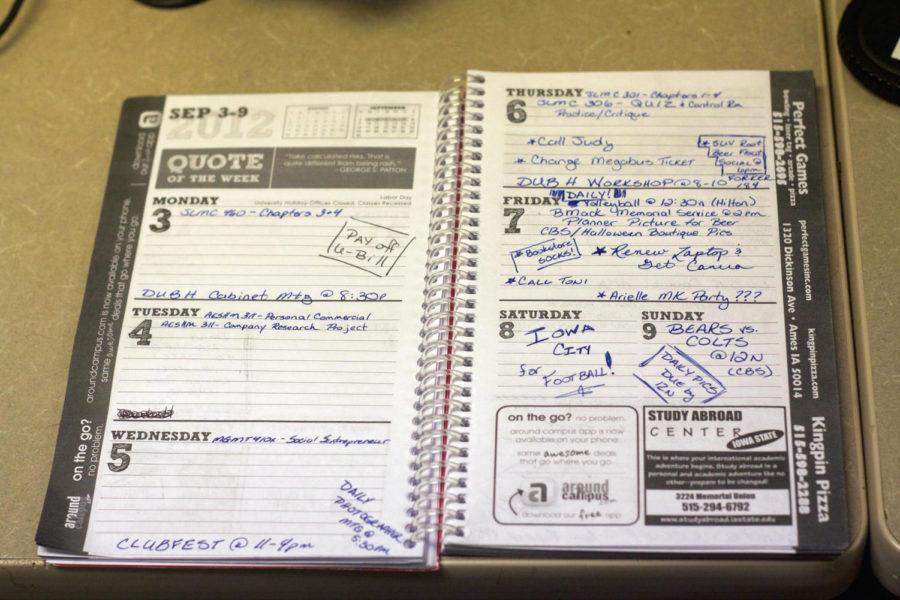Watson: Time management requires priorities
Photo: Christine DeCoudroux/Iowa State Daily
Opinion: Watson 9/20
September 20, 2012
Four weeks into my senior year of college, and I’m busier than a one-legged man in a butt-kickin’ contest. Two jobs, 18 credits and the overwhelming realization I need to find a career in a few months have left me with little to no time to complete the things I have to do, not to mention the things I want to do. I am learning firsthand the art of proper procrastination, and have developed a real zeal for late-night coffee binges. These skills are being honed in the name of portfolio development and efficiency, but it hasn’t been an easy road.
Before leaving for college, a wise man told me: “The key to life is balance.” At the time, I assumed it was merely a clever paradigm for “don’t drink too much”; but as I grow older and more mature, I am beginning to more completely realize the gravity of the phrase and finding it more true.
All work and no play makes Jack a dull boy; but all play and no work makes Jack a stupid boy without a job. The formula is different for everyone, but striking a healthy balance between work and play seems to always equate to success and happiness. Learning to navigate and adjust your life to allot the highest level of varying activities is the best way to assure both.
Everyone knows the party kid, who is really good at partying but seems to always be on academic probation. And everyone knows the bookworm kid, who gets really good grades but lacks an ounce of social skills. To many employers, neither one is much better than the other. Employable people are balanced in both; otherwise, they’re too dependent on co-workers, or too independent to be a part of a team. Take on varying activities, cut back on others if you must.
It goes without saying, you can’t juggle too many obligations without some serious organizational skills. Best advice: If you don’t have a planner, get one — it will change your life. I use a pocket planner; throw it in your back pocket when you start the day so it’s always with you, ready to spring into action to take down some vital information or save the day by offering a quick reference.
It’s not hard to make yourself busy at college; it seems a rare night when your mind can shut down the “to-do mental task book” and close your weary eyes with another day and finding sleep to come on swiftly. A more common pattern — lying awake recounting the day, dwelling on tasks yet to be checked off the list.
When I’m getting ready in the morning to take on the day’s adventures, I try to mentally organize and prioritize my “to-do list.” Through trial and error, I have found thinking, “oh, I need to do this later,” often isn’t enough. It’s easy for a task to fall through the cracks after a long, action-packed day. Think specifically about the task and what it will require to accomplish it in a step-by-step, visual mapping process. For instance, instead of thinking, “I need to print this later,” think about what part of your day will most efficiently allow you to print it, then actually picture yourself doing it. Allowing yourself to be flexible only opens more doors.
Learning where you can afford to cut corners and where you can’t is a useful skill to have. Forgot to write that paper that’s due in two hours? Don’t waste time trying to write a captivating introduction, just dive into the body, the rest will come together as you write. When doing homework on a crunch, start with the assignment in the class with the lowest grade. You will have more focus and your brain will be sharper.
I’m not giving you such excellent schoolwork advice because I promote laziness, mind you; but I strongly believe no one is hired based off grades alone. The books must be occasionally closed to allow yourself to develop the well-rounded skills our present world demands you to have. Get active: Join clubs, passionately pursue a hobby or two, meet new people; you will be surprised what you learn.
Laziness claims countless victims everyday. If you can learn to fight your way through the overwhelming desire to do nothing, you will learn skills without even realizing it. It is the successful who know how to successfully balance a full workload, and its not necessarily because they’re smarter, it’s because they’re better organized and determined. Want to be successful? Start by learning the art of schedule balancing.

















